#azama higashi
Explore tagged Tumblr posts
Photo

CHOUJIN X, CHAPTER 35 THOUGHTS.
Chapter 35 shows Tokio’s separation from his friends, and the themes of nihilism Ishida weaves into his manga. The central conflict between Tokio and his best friend Azama early on where one of them is referred to as the vulture and the other the lion is a reference to Nietzsche’s philosophy. The lion in particular is one of the three metamorphoses Nietzsche lists in Thus Spoke Zarathustra. In this chapter, Tokio is embarking on his journey through those three metamorphoses which symbolize the three stages of life and development.
1. The Wilderness
Thus spoke Zarathustra is a work in which Nietzsche expounds upon several of his key concepts, including the superman, self-overcoming, and nihilism. The main theme of Thus Spoke Zarathustra is the portrayal of values as either creative and life-affirming, or ascetic and conformist.
The basic idea Nietzsche puts forward in his work is that all ideology, rules and morality of any given society are created rather than inherent. Which means morals and laws and commandments don’t come from gods, they come from human beings. They are the inventions of human beings and enforced by human beings.
Nietzsche’s idea that there’s no inherent morality isn’t suggesting that morality doesn’t exist, or that there are no rules therefore you can do whatever you want, but just that you should not blindly follow the rules. Nietzsche refers to Christianity as the “old morality”, which someone has to shed away in order to be someone who can create their own morality.
Which is why Choujin X primarily being a superhero manga, where characters with super powers fight villains, follow the law and save people as heroes of justice is such a good place for a Nietzschean dissection of morality.
From the start Tokio is identified as a character who basically has no ideals, he begins the manga making no decisions for himself, and just copying whatever Azama does.

Azama is a believer of justice unlike Tokio, who puts a lot of work into studying and martial arts because he believes in his own personal justice. Azama’s introduction in the manga is even the classic saving a woman from a thug attacking her scenario that’s featured in many comic book superhero stories, but what’s important about that scene is TOkio is the one who stumbles upon the woman in trouble and even though he knows he should do something he just sits there and watches waiting for Azama to come help. That says a lot about Tokio’s character, he has no morality or ideals he fights for he’s just a shallow copy of Azama’s ideals.
If the central theme of Choujin X is what Choujin do with their superhuman powers, then Tokio despite suddenly being given power and more power than Azama. Yet, Tokio stays the same old pathetic and indecisive person.
Which is why Tokio needs to go through these stages of metamorphoses, because up until this point in the manga he still had not developed any ideals of his own and instead borrowed from both Ely and Azama at the same time. He was still following the old values. Which makes sense why his separation from Ely and Azama is necessary for his growth into his own individual.
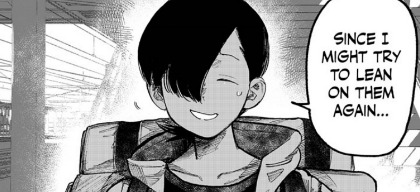
Nietzsche’s three metamorphsoes parallel in Thus Spoke Zarathustra follows three stages. The camel, the lion, and the child. The first stage begins with the camel is suddenly burdened. Nietzsche gives several examples of what those burdens are, but it all boils down to self-examination.
“Why is it heavy? So asketh the load-baering-spirit; then kneeleth it down like the camel, and wanteth to be well laden. What is the heaviest thing, ye heroes? asketh the load-bearing spirit, that I may take it upon me and rejoice in my strength.” (Thus spake Zarathusra).
It’s hard to think for yourself, and it’s easy to follow others. This is the state Tokio was in just before he was told of his potential destiny as the one to stop the destruction of Yamato.


He’s still chained to another person’s belief system. Which is why while Tokio disappearing from Azama and Ely’s life is a little bit selfish and hurtful, it’s also something that was probably necessary for Tokio’s development as an individual.
Nietzsche states the thing that camel does to move onto its next development is to separate itself from others and retreat into the wilderness.
“All these the heaviest things the load-bearing sprit taketh upon itself; and like the camel, which when laden, haseneth into its wilderness.”
(Thus Spake Zarathustra)
Which mirrors the necessary journey that Tokio akes this chapter, to venture into the wilderness and separate himself from others so he can become strong and independent enough to carry his own burdens. In response to Tokio suddenly realizing that he has great power and potentially a great destinty to save Yamato as a choujin and because of that he needs to become someone responsible enough to carry those things.The next phase is the lion.
Which is most likely the stage Azama is at right now. At the stage of the lion , you begin to create your own morality.
All values have already been created, and all created values - do I represent. Verily, there shall be no “I willl” any more. Thus speaketh the dragon, My brethren, wherefore is there need of the lion in the spirit? Why sufficeth not the beast of burden, which is renounceth and is reverent? To create new values - that even the lion cannot yet accomplish: but to create for itself the freedom for new creating - that can the might of the lion do. To create itself freedom, and give a holy Nay ecen unto duty;for that, my brethren there is need of the lion.
(Thus Spake Zarathustra)
Therefore, Azama who already has his own convictions and idea of justice was already at this stage, whereas until this point Tokio was only ever playing catch up to him.

We see the chapter end with Tokio’s journey into the wilderness, because he needs the might of the lion to begin to create his own values and think for himself. The third stage would be child, where Tokio is essentially reborn as a new person, his own person rather than a shallow copy of other people.
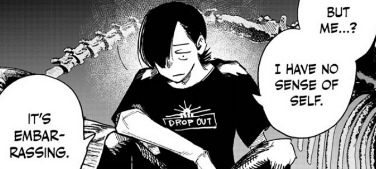
Which is why the ultimate goal in this manga is to become a “Choujin” (the direct translation of this word in Japanese is superman), which relates to the nietzschian idea of the ubermensch.
Nietzsche puts forward we follows these stages of metamorphosis i order to create the ubermensch or superman. Having gone through an old morality, creative spirits can shed the influence of others and ultimately create a new way of being in the world. Such a new being would involve not only a new perspective, but a new set of values with their own rationale.
“There was it also where I picked up from the path the word “Superman” and that man is something to be surpassed. THat man is a bridge and not a goal - rejoiciing over his noontiedes and evenings, as advances to new rosy dawns.” Thus Spake Zarathsutra
Tokio’s journey into becoming the superman has nothing to do with becoming the smartest or the strongest, but learning to be his own person and think for himself without following others.
40 notes
·
View notes
Text

CHOUJIN X, CHAPTER 36 THOUGHTS
Last time on Choujin X we went through and entire year of our characters living apart and endeavoring to be heroes, now we return to Tokio’s story the same day he returns to his friends. A lot has happened, so let’s cover it underneath the cut.
1. The More Things Change, the More They Stay the Same
As the first chapter after the timeskip, and therefore the beginning of a new chapter of the story there are several parallels in this chapter for the first few chapters of the manga. Starting out with beginning on a plane ride with Choujin Girl talking about her dream.

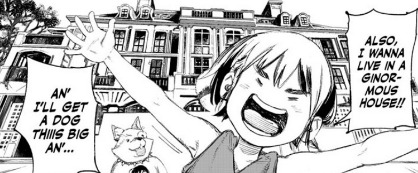
The new girl’s dream even resembles Ely’s it’s equally shallow dreaming of being rich and having hunky guys falling all over her. This chapter also starts out with a plane hijacking, although the difference is Ely was the victim of a hijacking while this girl is the perpetrator in this scenario.
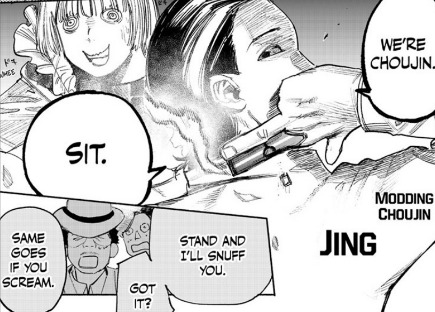

This time as well, Ely is also on the planet but her place is reversed. This time she is the one powerful enough to save the plane from the enemy Choujin, while before her survival against Chandra Hume was more or less a complete accident because of the awakening of her power. She’s gone from victim to hero more or less.

Chandra also used his smoke power to crash the planet, while Ely is able to use her power to bring the planet down safely with no fatalities, even if the choujin they were fighting got away.
Azama is in an interesting position as well. The time spent training seems to have made him gain enough confidence in his power he’s freely using them without berserking or going in control, essentially returning to the confident Azama we meet at the beginning of the manga. At the same time, despite detaining the choujin they were fighting and winning the battle, they lose the war because Zora appears to crash the plane.

Which makes their victory feel hollow, despite the fact there were no survivors and the plane landed safely enough. At the beginning of the manga Azama was the one confident in his position as a hero, even without powers and Tokio was the one who constantly needed him to be around.


This time we appear to return to the self-confident and self-possessed Azama, fighting at the top of his game, and he still can’t win. Him and Ely notice Tokio’s absence from the group and wonder if they’re just not strong enough without his presence. On top of that, this might be speculation but I detect a note of bitterness in the way Azama refers to Tokio as Iwato’s hero.
Azama again has always had problems with the idea of Tokio separating himself and proving he can fight on his own. On top of that, the way they were separated with Tokio just deciding to cut them entirely out of his life without saying goodbye, probably doesn’t leave their relationship in a good space. Compare Azama, who failed to beat the bad guys and only managed to bring the plane down safely, to Tokio here who’s getting newspaper announcements claiming how he single handedly saved the day in Iwato.


Another parallel is the presence of Chandra Hume, the secondchapter of the manga is one long chase scene where Chie is the victim again and Hume is the perpetrator trying to hunt her down. This time, it’s Chie trying to chase Hume while he flees, using te power she stole from him while he’s been completely drained of his own smoke abilities.

At the end of the fifth chapter while Tkio is running away from the snake Choujin, he’s saved by Ely who arrives at the exact right moment. This time however, it’s Ely who’s cornered by another Toujin, and upon making his return to the prefecture the first thing Tokio does is return to save her. Once again the positions of the characters are flipped in this callback.


Ths is just an observation but while Tokio is pronounced as Iwato’s hero in the newspaper announcements, and was pictured in nature more confidently using his choujin transformation because of his fully developed wings, at the end of the chapter Tokio’s low self esteem seems to be very much present. He introduces himself in a lame-way in a very Tokio-like fashion, and instead of making his triumphant return he’s walking by looking beaten up in a pair of crutches.
Perhaps to show off the difference of how Azama might perceive Tokio having no contact with him, and only reading about him in the newspaper headlines where he’s off being a hero in some other prefecture. If not, then we’re meant to draw a comparison between Tokio’s full gledged state at the start of the manga, has he established himself as a hero now, or is he still a nobody like he believed himself to be in chapter one?
One last thing I would like to mention is the instigating event of Tokio and Azama awakening their Choujin powers. The whole reason that Tokio chose to become a Choujin in the first place, was not that he wanted to become a hero, but because if he didn’t do it he would be left behind by Azama.

Now we have the reversal of that situation. Azama is the one who was left behin because Tokio willingly separated himself without saying goodbye. Tokio likely had the same motivation, if he didn’t find his own way in the world he didn’t think he’d be able to keep up with Azama and Ely.
At the same time since Tokio didn’t bother to say goodbye or explain himself or even keep in contact, a pretty selfish thing to do just ghost a friend like that, Azama himself might see it as Tokio just choosing to leave him behind. Even if he had the exact opposite intention, to become someone stronger so they could stay together.
Either way, I believe all of these parallels to the first few chapters are intentionally used by Ishida Sui to say, things have permanently changed now and there’s no go back to the way things used to be, especially in the case of Azama and Tokio’s friendship, no matter how much the characters might wish to.
#tokio tsunashi#azama higashi#cx meta#choujin x 36#choujin x#choujin x meta#choujin x spoilers#ishida sui#ely otta
22 notes
·
View notes
Text
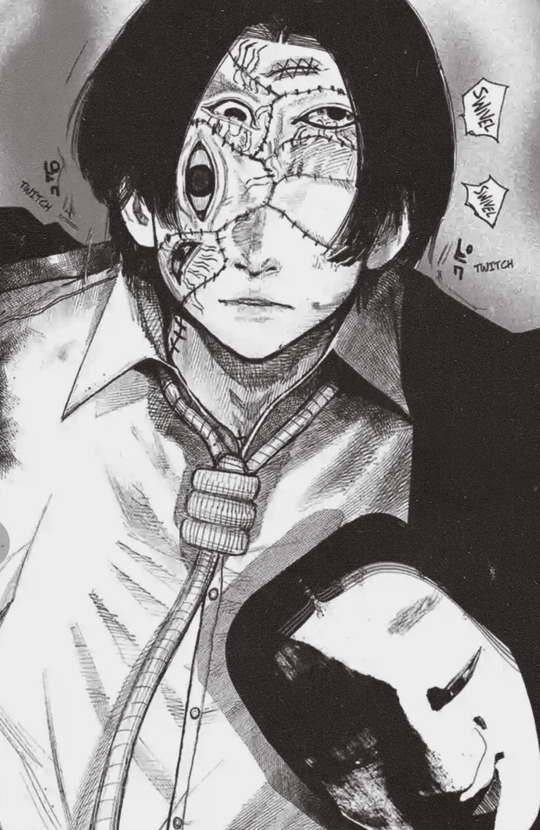
Choujin X, Chapter 34 Part 4 Thoughts.
A lot happened and not only was this chapter the climactic end of a major arc, it also seems to be a major turning point in the story especially in regards to Tokio's character and what is coming next for him. Thoughts and predictions underneath the cut.
1. The Other Brother
Perhaps the biggest reveal this chapter was the face behind the Noh Mask, and as usual for Ishida he actually foreshadowed this reveal long in advance. Now let's play everyone's favorite game of spot the foreshadowing. It started with Batista taking a special interest in Azama when he was previously targeting Tokio as the Beast Choujin.
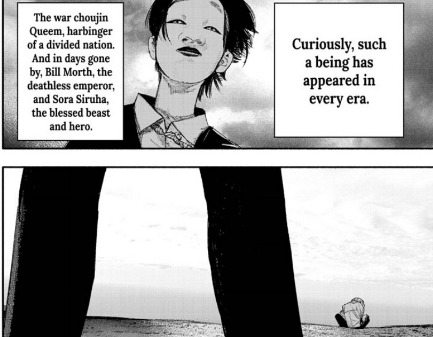
A few chapters later Sendak mentions his reasons for taking an interest in Azama and even councilling him about his habit of losing control and his emotional outbursts is because he resembles his younger brother who fell away from him.
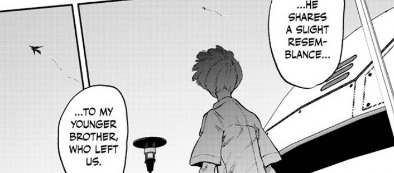
One more thing of note before moving on, while several key characters constantly note how much potential that Tokio has as the beast Choujin, and take an interest in him as someone who has the potential to change the world, it's mentioned over and over again that Azama's powers despite taking a long time to awaken and being hard for him to control aren't really anything special.



After being shown taken an interest in him a the end of Azama and Tokio's fight, Batista then goes out of his way once again to spare Azama and bring him along despite the fact he knows that his choujin ability doesn't really stand out in any way.
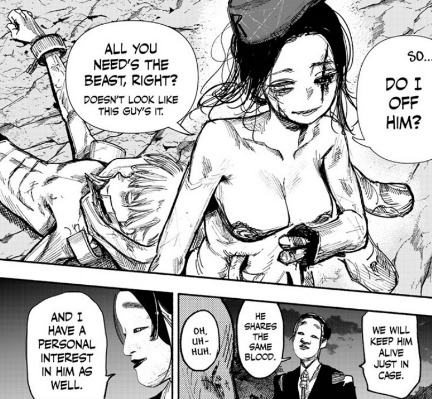
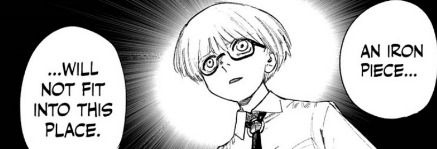

He even goes out of his way to ask for the power of the iron choujin and Ely, and is fine with only getting Azama. Whether he was going to just take Azama's powers from him with what his usual method seems to be (my guess is sewing other people's body parts onto himself considering his face and arm) or actually try to mentor Azama is unknown but he's expressed the same interest in him over and over again other characters have not.
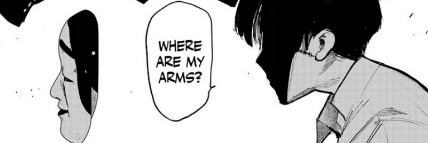
We know nothing of Sendak and Batista's conflict as brothers, however, there is a ton of foreshadowing for the rift that's already begun to form between Azama and Tokio growing wider as the story progresses Just from the nature of the difference between Hosi and Sendak's powers, Sendak's choujin ability seems to be at the peak of strength a Choujin can have. Whereas, Batista as the "chimera" either doesn't have a choujin ability of his own and gains his powers by stealing the body parts of others and grafting them to him, or his power wasn't strong enough to ever face Sendak's which made him resort to alternative means. Or a third option his Choujin ability only works by gaining the powers from body parts of other people he grafts onto himself, he has no natural ability of his own just stolen ones.
This is also the center of the conflict between Azama and Tokio. Tokio is blessed with insane and unique power, and a potential that has everyone targetting him, and he doesn't want it, and doesn't want to decide how to use it either.
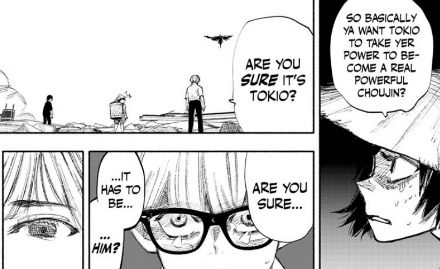
From the moment their powers awakened, Azama who was used to practically being the "hero" of their friendship got slotted into a secondary position. At first Azama didn't experience any change at all and thought he remained a normal person whereas Tokio gained powers and saved him.
Then, even after Azama's powers finally awaken, not only do people constantly comment on how his powers are no good if he loses control of them with emotional outbursts and hurts people which is directly against his self image and ideal of using his powers to help people, but he also despite finally awakening as a choujin is shown time and time again his potential is way less than Tokio's, and everyone is interested in Tokio as some kind of chosen one as he's passed aside.
If the relationship between Azama and Tokio is set to parallel Sandek and Batista then they probably suffered from a similiar fallout, Batista's older brother was one of the strongest choujin in a generation, whereas Batista's chosen method of getting strong was done most likely by stealing from others.
2. The Parting of Ways

The second biggest game-changer this chapter is Tokio's announcement that he is dropping out of school. Considering Azama, Ely and Tokio all attend school together this also probably means that Tokio's reason for quitting is to seperate himself from both of them so he can devote all of himself full time to being a Choujin.
Ishida has a tendency to reuse ideas from his previous works, and Tokio in many ways parallels Kaneki Ken, both of them being reluctant chosen ones, who were granted a great power mostly by mistake. This moment parallels Kaneki's decision at the end of the Aogiri arc in the original Tokyo Ghoul after being kidnapped and seeing Anteiku go to great lengths to try to bring him back, making the decision to not go home with them and instead go off on his own to try to get stronger. He even says it overlooking a body of water similiarly to Tokio.
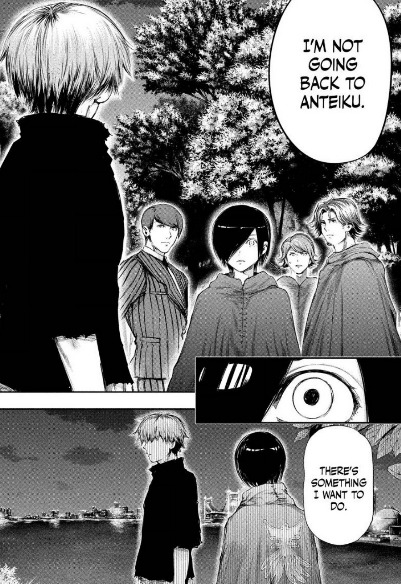

There's not just the Tokyo Ghoul parallel however, Tokio's seperation from Azama and Ely is set up within the story itself. Number one, the whole island arc in general has the setup of a shonen training arc with a twist. In regular shonen manga the trio of Azama, Ely and Tokio would train together, get stronger and then have their friendship solidified. Not only does none of the training any of the characters do pay off (they all just get captured anyway), but the already rocky friendship of Azama and Tokio seems like it's heading towards a seperation rather than bringing them closer together the island arc has even further driven them apart.

Just when they were getting along and both training together as Choujin, Tokio's premonition that Azama would blame him for the destruction of Yamato, and their argument on whether or not Tokio should accept the divine mark only showed the issues of their friendship are still there despite their temporary truce.

Not only that, but Tokio's newfound resolve to be strong enough to stop Azama if he goes out of control again was incredibly shaky to begin with. Almost immediately, an outsider is able to point out the flaw in his logic. That if he ties himself to Azama like that his self esteem isn't going to get any better, and he should find his own reason to fight rather than using someone else as an excuse.
On top of that Tokio is referred to as being shackled to Azama, because of his habit of constantly comparing himself to others, and wanting to be more like others rather than developing himself. His big moment of character development in this arc however comes from choosing to fly. Something he cannot do if he is shackled as flight = freedom.

I did a previous meta on how Tokio's indecisiveness is a sign that unlike the two other members of his group, Ely and Azama who have pretty opposite ideals but have their motivations figured out, Tokio is someone who could go either way on Ely's path, or on Azama's.
In an interesting twist Tokio has taken a third option, rather than becoming closer to Ely or Azama he has made the decision to separate himself from both of them (or at least I'm guessing that is what's going to happen next). If you consider the traumatic series of events Tokio has just been through, this decision makes sense from his perspective. To begin with this training arc was a total loss for all of them, Ely, Azama and Tokio make significant breakthroughs in developing their abilities but it doesn't matter they still get their asses kicked hard.
Tokio is made helpless, kidnapped and dragged into an unsafe environment. Not only that he's reminded how because of his helplessness he couldn't do anything to help Azama or Ely who were kidnapped alongside him. He also learns right away that due to being the beast Choujin, he was the reason the entire island was targetted and Ely and Azama were put in danger. You know just to sprinkle some extra guilt and self-blame on top of the cake.
Tokio reaches a pretty major breakthrough where he realizes instead of worrying about everything, he has to just take a leap of faith and fly (This is a spiderverse reference btw) only to hear the prophecy of the Beast Choujin and to have all of this responsibility and destiny suddenly shunted onto his shoulders and his response is just to revert to his previous indecisiveness.

Not only does his indecision cause all of his friends to get attacked once more, but even going berserk and using his choujin power to the absolute limit of his abilities, Tokio is completely useless in the fight once more.

Tokio witnesses his friends being crushed to death, goes berserk, and it barely makes a difference in the fight. Yes, he is rescued by Sandek shortly afterwards, but Sandeks rescue reminds Tokio that despite being a chosen and being told by the people around him of his potential just how far he actually has to go in terms of mastering his power. He's shown strength on a completely different level from him.

When he is finally rescued too, he is told to sit on a beach and wait, while a bloody battle is fought right in front of him, and his rescue comes at the expense of several choujin offering their lives.

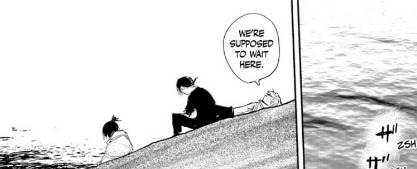
All the while Azama, Ely and Tokio are told to sit and wait because they'd be no help in the fight. Considering all of these circumstances, it's understandable that not only would Tokio blame himself for a lot of this by being so weak and indecisive of a person he needed to be rescued in the first place instead of being able to fight his way out of that situation, but he'd also think the only way to get stronger was to go off on his own and prove he could get stronger without relying on others. To become the kind of person who wouldn't need to be rescued so this kind of situation would never repeat itself again.
If you consider the survivor's guilt associated from surviving a long battle where you were mostly helpless, and even the cause of the battle needing to be fought in the first place, it would make sense Tokio would blame himself and think the only way to move forward is to be strong on his own. Which is why we see at the end of this arc, our three types of heroes, on three different paths, are probably going to drift even further away from each other rather than coming together.
#choujin x#choujin x meta#cx meta#choujin x theory#choujin x analysis#ishida sui#choujin x spoilers#choujin x 34.4#azama higashi#tokio kurohara#ely otta#hoshi sandek#sandek hoshi#batista sandek#chimera choujin
43 notes
·
View notes
Text

Choujin X, Chapter 34 Thoughts
Choujin X manga is shaping up to be a story about heroes, and I don't just mean that it's a story with superheroes in it. Now that Azama's powers have activated and the main trio of the story is together, all three of them are a different take on the concept of the "Chosen Hero". The main hero of a story who is the hero not because of any choice they made, but because of something they are born with, because they are essentially chosen by fate. More on the three main character all being different types of Chosen One underneath the cut.
1. Choujin X
At the end of Azama and Tokio's fight we are finally given an explanation for why this series is called "Choujin X". Once in every generation a Choujin is born with incredibly power and potential to either become the greatest hero, or the greatest villain.



This prophecy of X really does sound a lot like:
"Into every generation a slayer is born: one girl in all the world, a chosen one. She alone will wield the strength and skill to fight the vampires, demons, and the forces of darkness; to stop the spread of their evil and the swell of their number. She is the Slayer." - Buffy the Vampire Slayer, opening Narration
"X" is most commonly used as a variable you can substitute any number in. The Choujin is referred to "X" from a meta standpoint, because at this point it could be any three of the main characters, who all show the potential to become extremely powerful Choujin. This story is being told to us from a future narrator from a time when "X" has already changed the world, but the narrator hasn't revealed to us who "X" is, basically Ishida is challenging us to audience to guess who the chosen hero could be.
This is a story where there are three different heroes, each of them exploring a concept of what kind of hero they could be, and it's not clear which one of them is really the future destined hero the story is talking about.
2. The Chosen One
If you go by the most straightforward reading possible, Tokio is the main character, so therefore he must be the chosen hero. He is the first character to get his powers, when pushed to his limit he's actually stronger than Azama who has been learning martial arts all of his life and is obsessed with the idea of being a hero. He basically won the superpower lottery, was given a great power, and every single villain seems to be after him because of his great potential.
The catch is Tokio is someone who really does not want to be the chosen one. Every aspect of his character is written on how reluctant he is to stand out, to try hard at everything, he basically has to be dragged kicking and screaming into any fight or plot important event. He's entirely passive, he doesn't act, he reacts.

His own character profile mentions that he was able to get into one of the best schools of the prefecture just by working hard, which shows us that Tokio seriously underestimates himself and his potential.
Tokio ha many tropes surrounding him that a chosen hero has, there's even a prophecy surrounding him that he's going to save the world from a great potential disaster. At least a person capable of seeing the future thinks that Tokio could potentially fit into the role of chosen savior. The plot basically hands Tokio a lot of power, they even try to force a mark onto him that would give him a serious power up, the other characters even try to slide him into the role of chosen one.

Tokio however, does not want this role at all, because he is at his essence a character who does not make his own choices, and does not do anything for himself. When asked if he wants to accept the power, Tokio more or less just procrastinates his decision.

Tokio is a classical anti-hero not in the sense that he's edgy and kills people like the punisher, but because he is a central character in a story, movie or drama who lacks conventional heroic attributes. An anti-hero can just be someone who isn't brave, or strong, or even particularly noble. Tokio is going through a hero's journey but he doesn't really have morals or ideals, he's not even motivated by justice or even to help people like Azama. He's really just going along with the flow and being dragged by the nose.
In fact the story goes as far to establish again and again, Tokio doesn't really have any reason to be a hero, and he uses the other people around him as his reason. When he states that he found a new purpose for becoming a Choujin, it's really the same thing he's always done, which is copy everything Azama does and revolve his life around him.


Everyone else has their motivations but Tokio has no reason to be a hero, nor is he a particularly good one.
2. The Unchosen One
Azama on the other hand is the character who would be the main character in any story, a character with a strong sense of justice, someone who has much more selfless motivations, and yet in this story he's relegated to side character.
At the start of the manga he's bitter that when they both took the same serum, Tokio was chosen and receives special powers while Azama seems to have not changed at all, and he only spirals further from there.

Even when Azama does get his own powers, he stills loses to Tokio once more. It's even stated that Azama's despair at losing was not because he's weaker than Tokio, but because something has changed in their relationship, on top of feeling like he's no longer the hero in his own personal story, he's no longer Tokio's hero either.

Of the three Azama has what most would consider the most classically heroic motivations, unlike Tokio who is suddenly gifted with a great power and has no idea how to use it, even when Azama is powerless he walks straight into danger for the selfless goal of saving someone else.


He's the only one of the three that has any sense of idealism and moral rightness, and yet at the same time there's a hidden element of selfishness to his actions he is unaware of. His desire to be the hero is also a desire to be special and important, he wanted to become a choujin not just to help people but to have powers. Powers are what make you stand out from the crowd after all make you someone who's not just one of the many mediocre people in the world.
He is someone who leaps at every chance he can possibly get to be some kind of chosen one. He even wears the armor of a knight a pretty classic symbol of a selfless hero. He's also the first one that believes in the prophets idea of seeing the future and predetermined destiny, because he secretly desires to be that kind of special chosen one.

3. The Wild Card
While Azama and Tokio have contrasting attitudes of what being a chosen hero is, Ely is the outlier because her motivation is basically having no motivation. She wants to come to the city, marry a rich hunk and live a comfortable life.
She doesn't take the role of being a Chouji seriously at all, she makes jokes with her power, she is a helpful person who will fight when she needs to but she's not really fighting out of any idealism like Azama. She doesn't even seem to have any standout qualities of her own, even her power at first doesn't seem to be unique, just a copy of the smoke choujin's power.
However, Tokio notices right away that despite her claimed shiftlessness and lack of motivation, she's much more of a plucky self starter than he will ever be.

Ely's motivations are so simple they're almost primal too, she just wants to have a lot of money, eat good food, live an easy live, have a gorgeous husband. This almost makes her an ID character. ID is short for "I desire" in psychoanalytic theory, it is the part of consciousness that represents unfiltered desires and drives.

The drive to eat, the drive to reproduce. Freud says of Id, Ego, and Superego, the Id is the child of consciouness because children just want things without any reason, and don't really think of anything but satisfying their most basic needs. A child throwing a tantrum because they're hungry doesn't really understand they're causing problems, all they know is that they're hungry and not getting food.
This is shown in her fight against the Smoke Choujin, if you boil down her motivations to their simplest form the only thing she really wants is to live, and she can justify even murder if it means she'll live. Her entire motivation is based off of her survival instinct. While Azama has a sense of rules and ideals he follows if someone threatens her life Ely has no problem whatsoever with murder.


Which knowing her backstory is ironic. Ely was basically raised to be the exact opposite of her infamous thieving, pillaging mother and yet at the same time when the chips are down she'll steal too in order to survive. In fact there's a lot of foreshadowing that her power isn't even smoke at all, but stealing other choujin's powers considering she could devour the smoke choujin completely.


So we have the most selfishly motivated of the three, unlike Tokio and Azama who are tied up in motivations of heroism, Ely's goal is just to do what she wants, live how she wants, and unlike the other two she's shown to be the most capable of thinking for herself which is why she doesn't even believe the notion that there's a destiny or a prophecy at all.

So who's the hero of the story? Only time will tell, but the three main characters aren't just superheroes, they're strong and interesting characters in their own right.
#choujin x meta#choujin x 34#choujin x#choujin x spoilers#azama higashi#tokio kurohara#ely otta#cx meta
31 notes
·
View notes
Note
I love your choujin x meta about the heroes but I also think it's interesting to note that Ely and azuma are both extremes of different paths to take, whereas Tokio, the voice of the narrative and the "guide" to the viewers, is not in any which way and you can't really tell which direction he'll take in terms of motivation. There's the Ely who is selfish but admits it, and only wants to help those directly in front of her, and there's the azuma who appears to be completely selfless but has a hidden selfish desire to be exalted as a hero who saves everyone.
Neither one are considered wrong by the narrative, but they both read as two different types of heroes that Tokio could become if he just... made a decision about it.

Thanks for sending this your thoughts are really interesting!
To take it one step farther, not only is Tokio the audience guide into the world of Choujin by being a character who really has no ideals of his own, he’s also kind of a play on the typical “audience insert” character, especially the kind of main character that starts out as a useless nerd and is given a great power. Tokio is not given a sense of self on purpose because he’s the one that readers are meant to identify with and the one in the middle of the push and pull between Ely’s ideology and Azama’s. He’s also showing us how a person with no sense of self would act in this scenario.

Tokio refuses to make a choice to the point where it is downright infuriating. Tokio almost makes an ideal character for showing the difference between Ely and Azama’s motivations, because Tokio bases his entire sense of self over just trying to please whoever is nearest to him.
Basically in regards to both Azama and Ely he continually builds them up on pedestals, in order to dig himself further down. He has no self esteem or belief in himself and so at every available opportunity he just copies someone else so he doesn’t have to make any choices.


If the whole purpose of the manga is analyzing Ely and Azama’s contrasting ideologies, a selfless person fighting for a greater ideal who at times can be secretly selfish and an admittedly selfish person who’s capable of being selfless but only really for their friends and loved ones nearby. Then Tokio is a great person to analyze these ideas with because he sort of just gets rawn into acting like both of them whenever they are around.
He has spent most of his life copying Azama after Azama saved him from bullying, and while he meets Ely and his admiration for her seems to spark a change in his thinking I would argue he is putting Ely on a pedestal the same way he does Azama. Rather than striking out indepednently, he’s just exposed to a new way of thinking and decides to start copying her too.




Tokio’s not really found his own motivation, nor has he taken the steps towards figuring out what he wants to do, so much as he has now found a new person to leech off of. As an audience guide though this is a good quality for him to have because just like the story is interested in exploring both of these ideologies from a neutral stance, Tokio is really neutral between Ely and Azama and is swayed by both of their ideologies and at times imitates both of them.
This is once again because of Tokio’s complete lack of self worth he puts other people as talented, other people as hard workers, in order to both make excuses for himself and hate himself. His sense of self esteem is so low he really can’t motivate himself for his own reasons, he’s always got to use other people as an example. Ely doesn’t really so much as inspire him to become independent so much as she’s another Azama to him, albeit one that pulls him in the complete opposite direction.


If Tokio is a tool to analyze others than it makes sense that his entire character revolves not around himself, but him trying continually to copy the motivations and ideals of other people because he has none of his own. Rather than doing the work of just thinking for himself and analyzing himself instead he’s constantly analyzing others and trying to be more like them.
Which is what Kagomura eventually points out to him, that while he thinks he’s becoming more independent and learning about himself this way, he’s really not.


Tokio believes some sort of change has happened for him and he’s now starting to live for himself, but once again he’s not really trying that hard to learn about himself, know about himself, he’s just still making it all about copying other people because he can’t find any self-worth in himself.
Just like you said though if Tokio could be bothered to make a choice, he is someone who could go either way between selfish and selfless. Which is why I think flight is a major theme of his character, because Tokio shackles himself to other people whereas flight isn’t something you can do when you are shackled. Tokio is actually entirely free to define himself, to choose, and because he’s not set in his ways like Azama and Ely is he might have the most freedom to choose over the three of them, but that’s only after he learns that he has that choice.
26 notes
·
View notes